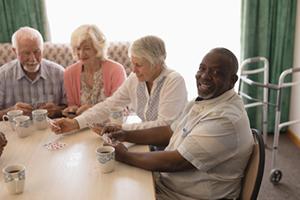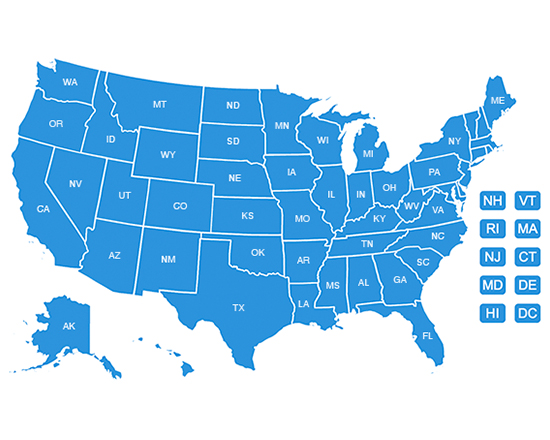The Nursing Home Law Center is committed to providing the legal resources necessary to hold negligent facilities accountable.
Group Home Abuse Lawyer

Older adults have important decisions to make as they age. Eventually, the condition of their bodies and minds may force them to find new living environments that can provide consistent care. Unfortunately, many seniors living in these communities are vulnerable to abuse from other residents or staff members.
Let’s discuss how group homes work and why they are often sites of abuse and neglect. If you or a loved one has suffered group home abuse, an experienced lawyer can help protect your civil rights and hold facilities accountable.
What Are Group Homes?
A group home is similar to a nursing home but typically much smaller. It is ideal for those with disabilities, mental health conditions, or higher care needs. While nursing homes are designed for individuals who require constant care, group homes are often tailored to more independent individuals. They may still require daily living assistance, but their needs are not as great.
Group homes typically have a higher staff-to-client ratio. Individuals with disabilities or mental health conditions and elderly residents can find adequate care and independence in group homes.
Recognizing Group Home Abuse
Although group homes should be safe environments for all residents and staff, they are common locations for abuse and neglect. Individuals with disabilities may not know their civil rights. Learning to recognize abuse in a group home is essential to protect yourself or your loved one.
Types of Abuse
Negligence in a group home can lead to many forms of abuse or neglect. When staff do not provide the expected standard of care or treatment, residents may suffer harm. Here are a few examples of abuse that could occur in a group home setting.
- Physical abuse is one of the most common issues in living environments with vulnerable residents. It can involve a staff member hitting, slapping, pushing, unfairly restraining, or using any type of physical force. Staff members could become frustrated when dealing with a difficult resident, resulting in them using force to control the individual.
- Emotional abuse is also an issue in group homes. Examples of emotional abuse include yelling, name-calling, humiliation, making threats, and isolating residents. These actions can manipulate or control behaviors in a group home.
- Staff neglect causes many problems in nursing and group homes. Staff not paying attention or cutting corners with certain practices can endanger residents. Failing to provide basic needs like food, water, hygiene, medication, and supervision is an example of neglect.
- Unfortunately, sexual abuse also occurs in group homes nationwide. Unwanted sexual contact, exploitation, and harassment can make a group home a living nightmare for residents. People with disabilities are typically not mentally competent to give consent.
- Financial exploitation occurs when staff or residents take advantage of others to manipulate their finances. This could include theft, misuse of funds, unauthorized purchases, or resident coercion for financial benefits.
Signs and Symptoms of Abuse
Family members should know the signs and symptoms of abuse and neglect in a group home. If you are on the lookout for these signs, you can take action to protect your loved one from abusive behaviors. Common symptoms victims of abuse display include:
- Physical injuries
- Behavioral changes
- Withdrawal
- Fearfulness
- Unexplained financial transactions
- Missing possessions
If you notice these signs, alerting administrative staff or a lawyer would be best.
Causes and Contributing Factors to Abuse in a Group Home Environment
Group homes can create abusive environments for many reasons. If you or a loved one are searching for a group home, there are numerous elements to look for that could be warning signs of a dangerous environment. Here are some common causes of abuse and neglect in group homes.
Inadequate Staffing
The healthcare industry at large struggles with understaffing. When there are not enough staff members in a particular group home, one resident could slip through the cracks and not receive proper care or supervision.
Understaffed group homes struggle to meet the needs of every resident, which can create opportunities for abuse or neglect. With less staff, residents have less supervision, making it easier to take advantage of them.
Lack of Training and Supervision
Even if a group home has enough staff, professionals must have proper training to provide services and medical treatment to residents. This is particularly true when working with adults or children with disabilities, such as autism.
Inadequate training is a significant problem when paired with understaffing because group homes may be desperate to find workers and lower their standards for job qualifications. Poor training could place residents in danger if they deal with serious injuries or have high care needs.
For example, if staff are not trained in how to move a resident from the bed to the chair, they could drop the resident and cause significant bodily harm.
Resident Vulnerability
More vulnerable residents are more likely to be victims of abusive behavior. Those with physical or intellectual disabilities may not be able to defend or advocate for themselves, making them easy targets.
Additionally, these residents are less likely to report incidents to administrators. As a result, group homes with higher numbers of impaired residents face additional risks.
Lack of Oversight and Accountability
Just as patients must be supervised by staff to ensure their needs are met, staff members must be overseen by supervisors to ensure they follow safe practices. The lack of oversight can result in staff cutting corners when providing services. If there is no accountability when incidents do occur, the abusive individuals can continue to behave poorly.
Taking Action Against Group Home Abuse
The best way to make group homes safe for every resident and caregiver is to hold communities accountable. Those who have been abused or know family members who have must take action. Here are some practical steps to hold group homes accountable.
Reporting Abuse
The primary practice for accountability is reporting abuse through the proper channels.
You can make a complaint to the administrators of the group home or facility if you suspect your loved ones are experiencing abuse. Contact Adult Protective Services if you want to report abuse and do not think the group home will take action.
The next step is to contact local law enforcement and inform them of the abuse so they can conduct an investigation. You can also contact licensing or state agencies that regulate group homes to file official incident reports.
Family Members Seeking Legal Help
If you have family in a group home and suspect abuse or neglect is occurring, you should seek legal advice from an experienced lawyer. Nursing and group home lawyers understand patient rights, including if they have a disability. We also know what it takes to recover compensation if legal damages have been suffered. Consult with a lawyer before taking action to increase your chances of success.
How to Prevent Nursing Home Abuse
Nursing home and group home abuse can result in significant harm. They may suffer serious injuries, infections, worsening conditions, or even death if a staff member behaves negligently. Here are a few strategies for preventing abuse and neglect in a nursing home or group home setting.
Background Checks and Screening
For a healthcare professional to provide adequate care to a resident, they must be thoroughly vetted by the group home. This typically includes background checks and in-depth screening to weed out unqualified or dangerous applicants. If you are helping a loved one move into a group home, research the facility to ensure your family member is placed in a safe environment.
Regular Training and Education
Care standards are not static. They often change to adapt to new research. As a result, the most effective group homes prioritize ongoing training and education for their staff.
These caregivers should consistently learn about the latest healthcare methods and standards to ensure they provide residents with the highest level of care. Additionally, all staff should be trained to prevent, recognize, and report abuse.
Strong Oversight and Monitoring
Since many group homes are owned and operated locally, oversight and monitoring could be an issue. They may not have inspections scheduled by state agencies as often as larger organizations that run multiple nursing homes.
For a group home to be safe, it must be regularly inspected to ensure all facilities and staff protocols are up to standard. Monitoring practices must be enforced to supervise residents and staff throughout the day. Resident advocates should be onsite frequently.
Secure Expert Legal Representation!
Moving a loved one or yourself into a group home is a big decision. Many of the residents in these environments are particularly vulnerable to abuse or neglect, especially those with physical disabilities or cognitive impairments. An abusive situation can cause injury, illness, or death.
If you or a loved one have suffered in a group home setting, you may have grounds for a lawsuit to recover compensation for legal damages. If you win your group home abuse case, you could receive a settlement to pay for losses like medical bills, emotional distress, physical pain and suffering, or loss of enjoyment of life.
The Nursing Home Law Center team is ready to support you through this legal process. Our team knows what it takes to win a group home abuse case. Our process involves a thorough investigation to uncover evidence of your suffering and proof of wrongdoing by the group home staff.
We will assess all damages to ensure the settlement adequately covers your losses. An experienced attorney will then negotiate with the insurance company or group home for fair compensation. If your case goes to trial, we will represent your interests throughout the proceeding.
Call the Nursing Home Law Center today at 800-926-7565 or complete the contact form to request your free consultation.


